 History
History  History
History  Weird Stuff
Weird Stuff 10 Wacky Conspiracy Theories You Will Need to Sit Down For
 Movies and TV
Movies and TV 10 Weird Ways That TV Shows Were Censored
 Our World
Our World 10 Places with Geological Features That Shouldn’t Exist
 Crime
Crime 10 Dark Details of the “Bodies in the Barrels” Murders
 Animals
Animals The Animal Kingdom’s 10 Greatest Dance Moves
 Movies and TV
Movies and TV 10 Box Office Bombs That We Should Have Predicted in 2025
 History
History 10 Extreme Laws That Tried to Engineer Society
 History
History 10 “Modern” Problems with Surprising Historical Analogs
 Health
Health 10 Everyday Activities That Secretly Alter Consciousness
 History
History 10 Dirty Government Secrets Revealed by Declassified Files
 Weird Stuff
Weird Stuff 10 Wacky Conspiracy Theories You Will Need to Sit Down For
 Movies and TV
Movies and TV 10 Weird Ways That TV Shows Were Censored
Who's Behind Listverse?

Jamie Frater
Head Editor
Jamie founded Listverse due to an insatiable desire to share fascinating, obscure, and bizarre facts. He has been a guest speaker on numerous national radio and television stations and is a five time published author.
More About Us Our World
Our World 10 Places with Geological Features That Shouldn’t Exist
 Crime
Crime 10 Dark Details of the “Bodies in the Barrels” Murders
 Animals
Animals The Animal Kingdom’s 10 Greatest Dance Moves
 Movies and TV
Movies and TV 10 Box Office Bombs That We Should Have Predicted in 2025
 History
History 10 Extreme Laws That Tried to Engineer Society
 History
History 10 “Modern” Problems with Surprising Historical Analogs
 Health
Health 10 Everyday Activities That Secretly Alter Consciousness
10 Vicious ‘Mean Girls’ Murders
Mean, spiteful, and hive-minded teenagers have always existed. This is true for boys and girls. The popular 2004 film Mean Girls simply updated the trope for the 21st century, although screenwriter Tina Fey deserves credit for turning Rosalind Wiseman’s piece of pop sociology into an eminently quotable comedy.[1] For 15 years now, any clique of superficial and nasty young girls gets the designation of “mean girls.”
Well, the groups of young women highlighted here are more than just mean. Most of them are cold-blooded killers who engaged in acts of barbarism that would have made Attila the Hun blush. Included in here are wannabe vampires, psychotic lesbian lovers, aspiring occultists, and run-of-the-mill brats. Binding all of these murderers together is blood—the blood of their innocent victims, many of whom considered their killers friends up until their last moments on Earth.
10 Too Pretty To Live
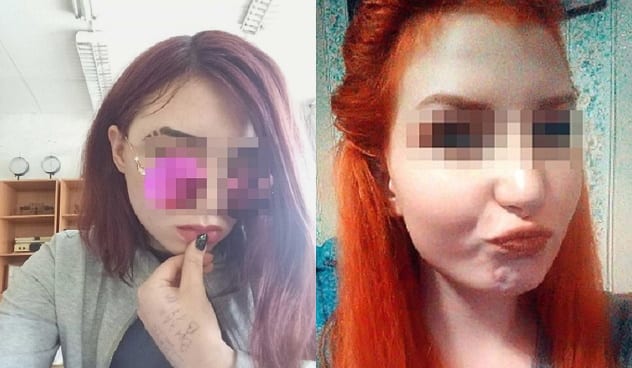
Seventeen-year-old Viktoria “Vika” Averina was a pretty girl. Everyone knew it. Apparently, Vika knew it too. Vika’s killers would later claim that they carried out their bestial actions in order to humble their vain friend.
In July 2019, Vika’s body was found inside an abandoned building in the Northern Russian city of Arkhangelsk. The mutilation that Vika had suffered was so severe that police initially suspected that a deranged man was responsible. Vika had been hit with several objects, including a glass bottle. Pieces of glass had been used to disfigure Vika’s face, and the killers ended their torture session by strangling Vika to death.[2]
It did not take the Russian police long to find the true culprits. Rather than a male predator, Vika was murdered by two of her friends, 16-year-olds Lina and Irina. (Police have yet to release their last names and probably never will.) Investigators have reported that both girls confessed to the crime, saying that they murdered the aspiring chef because Vika liked to bully them due to their inferior looks. Fed up with Vika’s arrogance, Lina and Irina lured their friend to the abandoned building on a false pretense. Once inside, one girl held Vika down while the other hit her with the bottle and other objects.
According to reports, all three girls had gone to the same school, and all came from relatively stable households. The case has yet to go to trial.
9 Lust For Blood
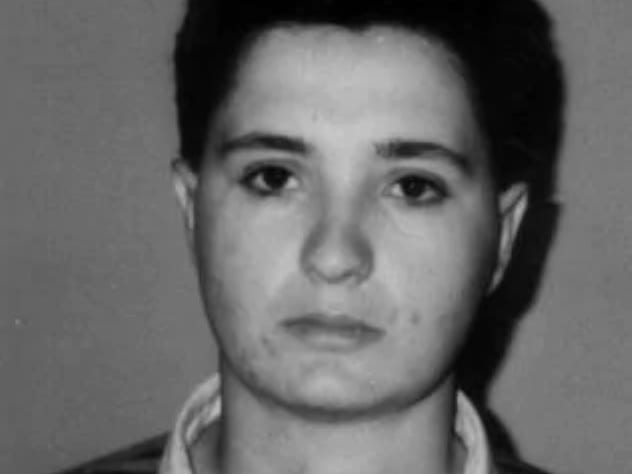
In hindsight, Tracey Wigginton bore all the hallmarks of a deranged person. Long before psychologists suggested that she suffered from multiple personality disorder, Wigginton evinced a deep-seated interest in violence, vampirism, and the occult. Wigginton was born in 1965 to a devout Roman Catholic family. This faith did not stop the family from repeatedly abusing young Tracey. Years later, Wigginton would become independently wealthy thanks to an inheritance. With this money, Wigginton went deep down the rabbit hole of her dark interests.[3]
Police officials in the Australian city of Brisbane would later deduce that Wigginton was the leader of a small circle of occult enthusiasts. Owing to Wigginton’s homosexuality, this circle of female friends also included at least one lover. By 1989, Wigginton’s group included 23-year-old Kim Jervis, 24-year-old Lisa Ptaschinski, and 23-year-old Tracy Waugh. Wigginton herself was only 24 when she carried out one of Australia’s most infamous and cold-blooded murders.
On the night of October 21, 1989, Wigginton and her friends whiled away the hours by drinking at a Brisbane bar called L’Amours. At some point, Wigginton asked her friends if they would be interested in murdering a stranger. All three later claimed during their trials that they agreed to go with Wigginton because they feared her. Wigginton was a large and powerful woman who worked in a factory. On top of that, all members of the group knew that Wigginton seriously believed in black magic and drank blood.
At approximately 11:30 PM, all four women got into Wigginton’s Holden Commodore. The car cruised the seedier parts of Brisbane in order to find a suitable target. The girls eventually found their man in 47-year-old Edward Baldock, a grandfather who they found drunkenly making his way to a taxi after putting back too many drinks at the Caledonian Club. When the girls approached Baldock, they offered him sex. The drunken Baldock agreed and hopped into the packed vehicle.
Wigginton drove to Orleigh Park and told Baldock to wait by the Brisbane River. She first helped the drunken man to remove his clothes and then, using some excuse, returned to her car. There, Wigginton got her lover Ptaschinski to agree to help with the murder. Wigginton and Ptaschinski attacked Baldock with hunting knives, but Ptaschinski fled after being unable to strike first. Wigginton had no such problem and stabbed Baldock several times in the neck and chest. All told, Wigginton stabbed Baldock 27 times and nearly decapitated him. After killing the man, Wigginton bent over Baldock’s neck and drank his blood.
Wigginton’s trial began in January 1991. She pleaded guilty to first-degree murder and was sentenced to life imprisonment. Wigginton first became eligible for parole in 2002, but her violent tendencies and a 2006 accusation of assaulting a prison guard and another prisoner kept her firmly behind bars. That all changed when she was released on parole in 2012. Wigginton made news in Australia again in February 2019, when a 9News investigation found that her social media was replete with images of vampires, skeletons, and graphic uploads featuring human remains.
8 The Sleepover Murder
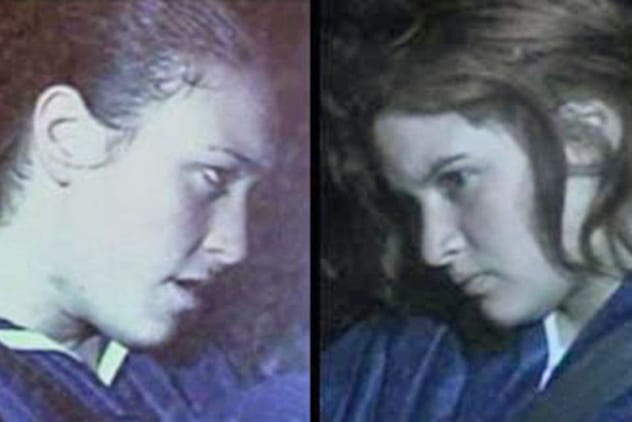
Seventeen years after the case of Tracey Wigginton, Australia was hit with another story about bloodthirsty lesbians. It all began when British-born Stacey Mitchell ran away from her family’s Perth home. At the time, Mitchell was just 16 years old. Mitchell found solace and safety by crashing with two friends: 19-year-old Valerie Parashumti and 21-year-old Jessica Stasinowsky. Unfortunately for Mitchell, Parashumti and Stasinowsky were not typical Perth girls. The pair were obsessed with vampires, the occult, serial killers, and all kinds of sadism.
Just days after letting Mitchell into their home, Parashumti and Stasinowsky turned on the younger girl. The older Stasinowsky did not like the fact that Mitchell had gotten close (if not romantic) with Parashumti. Stasinowksy, who considered Parashumti her lover, also hated the fact that Mitchell had a habit of walking around the house while wearing just a bikini. All of this anger came to a head on December 17, 2006. Parashumti and Stasinowsky attacked Mitchell by hitting her in the head with a piece of concrete. The pair hit the 16-year-old so many times and so hard that the concrete fractured. These blows did not kill Mitchell. Rather, the teenager died when Stasinowksy wrapped a dog chain around her throat and strangled her to death.[4]
Days after killing Mitchell, both women visited a hardware store in a Perth suburb. The pair purchased a chainsaw and some shovels. Mitchell’s body was found in a trash can before either girl could put their dismemberment plan into action. At their trial, Parashumti and Stasinowsky admitted that they had talked about killing someone for some time before targeting Mitchell. Also, while in court, both women smirked and giggled when the prosecution recounted the details of the horrific crime.
After they both pleaded guilty, Parashumti and Stasinowksy were sentenced to life imprisonment with a 24-year minimum term. Despite being kept in maximum security, the two women managed to maintain their relationship. The Sunday Times found years later that the two inmates regularly spent as much as 90 minutes together each week.
7 Alco Ange’s Last Snap

Angela Wrightson, 39, was one of the more colorful, if not infamous, residents of Hartlepool, Durham, England. Wrightson was unemployed and lived alone. Her fondness for alcohol earned her the unflattering nickname of “Alco Ange.” Wrightson was estranged from her eight siblings (all of whom had been placed in different foster families by the British state) and did not have many friends. The neighbors frequently complained about the loud and pugnacious Wrightson, while the police were familiar with “Alco Ange” because of her many hoax calls and 47 criminal convictions.
Despite her gruff exterior, Wrightson was known to open her home to down-at-heel people. On December 8, 2014, two girls aged 13 and 14 wandered around Hartlepool smoking cigarettes, drinking hard cider, and ingesting prescription pills. At some point during the night, the girls found Wrightson sitting outside of her apartment, located at 14 Stephen Street. The girls asked Wrightson to buy them alcohol. Wrightson obliged. Soon enough, the trio began drinking together. One of the girls pulled out a cell phone and began taking selfies and posting them on Snapchat.
For whatever reason, both girls, who were later identified with the pseudonyms of “Olivia” and “Yasmine,” pounced on Wrightson and began viciously attacking her. For five hours, the girls hit Wrightson with a piece of wood with protruding screws, a shovel, a television, and other objects taken from Wrightson’s house. Throughout the horror, the two girls continued to take pictures and post them on Snapchat.[5] After killing Wrightson, the girls called the police and requested a ride home. They posted one last photo on Snapchat from the back of the police van.
Following their arrest, the British media uncovered that both Olivia and Yasmine were products of profoundly unhealthy homes. Both families had histories of alcohol abuse and domestic violence. Both girls had spent time in foster care. There, staff reported that Olivia and Yasmine assaulted them, bullied other children, and engaged in sexual intercourse. After the murder, a drawing featuring a woman stabbing a man in the chest with a knife was found in one of the girls’ bedrooms.
Two years after Angela Wrightson’s murder, members of her family went public to express their desire for the passing of “Angie’s Law,” a piece of legislation designed to give the British police and social workers more power to intervene when there is evidence that a vulnerable person is being exploited.
6 With Friends Like That . . .

Michele “Missy” Avila was 17 and beautiful when she was found dead on October 4, 1985. Avila’s body was found in a creek inside of California’s Angeles National Forest. It was obvious that Avila had been murdered; her killer or killers had cut her long hair before holding her head underwater until she drowned.
On her last day alive, Avila told her parents that she was going out with her best friends, Laura Doyle and Karen Severson. After Avila’s body was discovered, Doyle and Severson became the obvious suspects. Both professed their innocence and told the grieving Avila family that they had dropped Missy off in the company of three unknown boys. The Avila family seemed to buy this excuse, and for years, Doyle and Severson did their best to try to comfort the family.
The charade was finally exposed in the summer of 1988. After almost three years of determined investigative work, detectives got both Doyle and Severson to admit that they murdered Avila on that October day. Why did they do it? Both girls maintained that they were mad at Avila for supposedly sleeping with their boyfriends.
In March 1990, 22-year-old Severson and 22-year-old Doyle were convicted of second-degree murder. The pair had barely escaped first-degree murder convictions; the Pasadena jury found that Avila’s murder had not been planned in advance. Both were sentenced to 15 years to life.
Severson was released on parole in December 2011. Doyle followed suit a year later. Both decisions were met with strident objections from Los Angeles County officials. Irene Avila, the victim’s mother, made her opinion about Doyle’s release clear when she told the media: “I hate her. I hate her. I hate her.”[6]
5 Heavenly Creatures
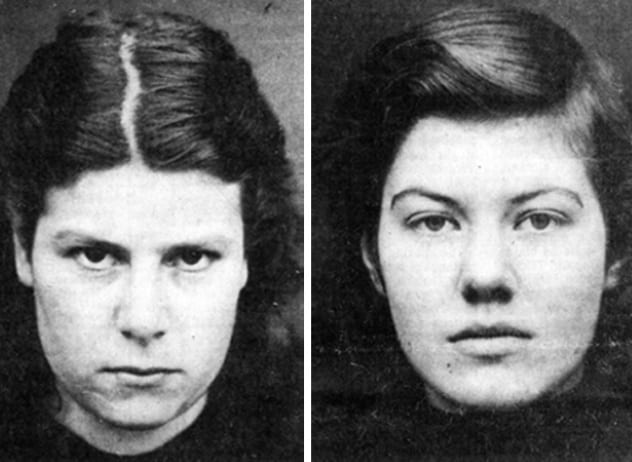
Sixteen-year-old Pauline Parker and 15-year-old Juliet Hulme were best friends. Both girls wanted to be novelists. Both lived in their own heads and often shared their dreams and aspirations with each other. From the outside, this was not unusual. After all, they were teenagers growing up in the then-tiny city of Christchurch, New Zealand. What else was there to do except to daydream?
There was a dark side to this relationship. The Hulme and Parker families suspected that the two girls were carrying on a romantic relationship. Lesbianism was frowned upon in 1954, with most psychologists considering it a mental disorder.[7] Hulme and Parker were certainly inseparable, and the pair began thinking more and more alike. They both began showing open disdain for the Bible and talked a lot about a “fourth world paradise.”
On June 22, 1954, the eccentric world of Pauline and Juliet took a bloody turn. Juilet’s parents had separated, Juliet was going to move to South Africa, and Pauline was sure that her mother wouldn’t let her go with Juliet. Using a stocking loaded down with a brick, the girls beat Honora Rieper, Pauline’s mother, to death inside Victoria Park. As bad as this murder was, the case truly became a scandal because of the trial. The girls would grow angry and violent whenever the authorities separated them, and such behavior convinced the conservative jurors of Christchurch that the girls were lovers and mentally ill.
On August 28, 1954, the girls were sentenced to prison. Following their release five years later, both moved to England and assumed new names. Juliet Hume changed her name to Anne Perry and became one of the world’s most successful crime novelists. The Parker-Hulme case also inspired New Zealand director Peter Jackson, whose critically acclaimed 1994 film Heavenly Creatures is about the case.
4 ‘Lots Of Fun’
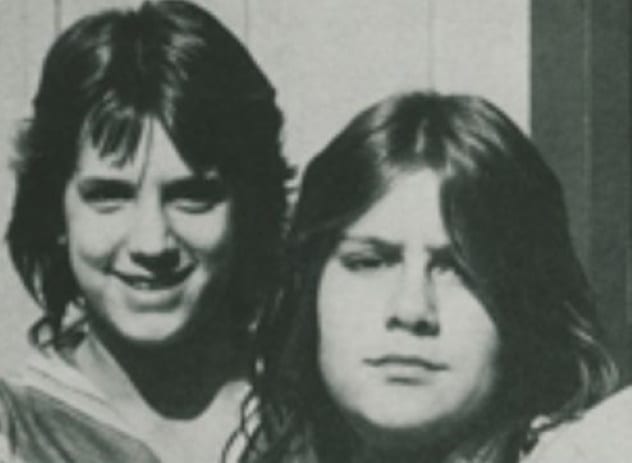
June 14, 1983, was a beautiful day in Auburn, California. Eighty-five-year-old Anna Brackett had seen a lot of beautiful days, and she certainly wanted to see more. Unfortunately for Anna, June 14 was her last day of life.
Anna answered a knock at her door. There, waiting on the other side, were two teenage girls. They asked the older woman for help, claiming that two strange men were following them. They asked if they could use Anna’s phone. She agreed. Hours later, Carl Brackett, Anna’s son, showed up at the house. Inside, he found his mother’s bloodied corpse. Anna had been beaten, strangled, and stabbed at least 28 times. One of the stab wounds was later measured at 10 centimeters (4 in) deep.[8] Carl did not know it, but he had already seen his mother’s killers hitchhiking.
Shirley Katherine Wolf was 14 and Cindy Lee Collier was 15 when they decided to murder someone. The only reason Brackett was killed on that day was because the other residents of Auburn were either not home or kept their doors locked. One resident did let the girls into her home, but the strange hitchhikers left when the woman’s husband showed up. Less than 12 hours after Brackett’s murder, police found Wolf and Collier sleeping in the basement of the Collier family home in Auburn.
A juvenile court found both girls guilty of murder in July 1983. Both received the maximum penalty under California law—imprisonment until they both turned 25. (Some sources say 27.) Collier and Wolf were proud of their actions, with Wolf saying in her confession that the pair wanted to kill “just for fun.” Collier wrote in her diary on the day of the murder: “we killed an old lady today and it was fun.”
Amazingly, Collier and Wolf were not friends and had just met prior to the murder. Both came from broken homes. Wolf’s father began molesting her when she was two years old, and both Collier and Wolf ran away from home and engaged in petty criminality. According to true crime author Joan Merriam, Collier earned a junior college degree while in prison and was paroled in 1992. She eventually married and had four children. Collier and Wolf still reside in California and are known to be involved in social programs designed to help victims of child abuse.
3 They Went On Three

Skylar Neese was fun and full of life. She was also an exceptional student at University High School in Morgantown, West Virginia. None of these good qualities stopped 16-year-old Skylar from being brutally murdered by her best friends.
Skylar Neese (right above) left home after midnight on July 6, 2012. This hadn’t been the first time. In fact, Skylar had skipped out on her parents, Dave and Mary Neese, plenty of times before, but she had always made it back home in time for school or work. But when Skylar didn’t turn up again later that day, Dave and Mary began to worry. The only clue concerning Skylar’s disappearance came from her best friends, Shelia Eddy (center above) and Rachel Shoaf (left above). Shelia told Dave, Mary, and Morgantown police officers that all three girls had gone out joyriding around the city. After smoking pot together, Shelia and Rachel dropped Skylar off at home sometime after midnight. If this were true, then an unknown person abducted Skylar during the few seconds it should have taken for her to walk to her bedroom window.
While Shelia and Rachel spent time trying to comfort Skylar’s grieving parents, investigators found security camera footage showing Skylar willingly getting into an unknown car at approximately the time when, according to Shelia and Rachel, Skylar should have already been in bed. In the halls of University High, many students suspected that Shelia and Rachel had done something to Skylar. After all, they were acting strange, and their social media accounts contained such cryptic comments as “We really did go on three.”
Sadly, Dave and Mary’s worst fear came true when Rachel confessed to police that she and Shelia had not only murdered Skylar but had spent almost a year planning the crime. Chillingly, when asked for a motive, Shoaf said, “We didn’t want to be friends with her anymore.”[9]
After Neese’s decomposed body was found in a shallow grave across the Pennsylvania state line in Wayne Township, the full horror of the murder became clear. On the night in question, the three teens drove out to a desolate stretch of road in order to smoke weed. At the count of three, which was a prearranged signal, Rachel and Shelia began attacking Skylar with kitchen knives, ultimately stabbing her between 30 and 50 times before cleaning up the scene and driving back to Morgantown. Although many still question the pair’s real motivation (theories range from a desire to keep a lesbian relationship secret to a heartless thrill kill), the case garnered national headlines due the role of social media in the investigation.
In 2013, Rachel Shoaf was convicted of second-degree murder and sentenced to 30 years in prison. Shelia Eddy, the person who first thought up and designed the crime, was convicted of first-degree murder and sentenced to life. As a result of this horrific murder, the state of West Virginia passed “Skylar’s Law,” which modified the Amber Alert system to include immediate public announcements whenever a child goes missing or is abducted.
2 Red Sun Rising
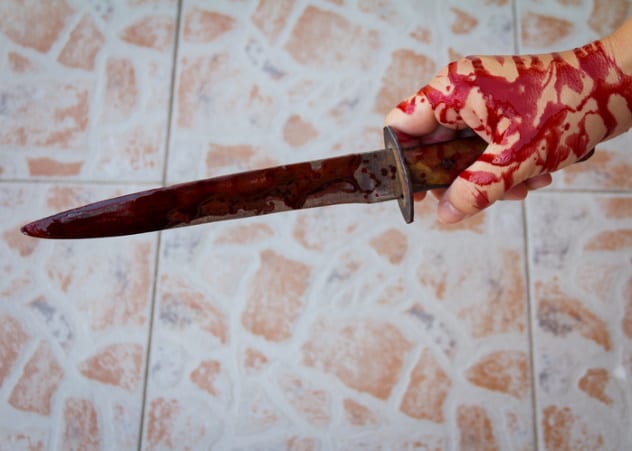
A lot of Japanese horror fiction takes place in schools. Thanks to parental and academic pressures, school in Japan can be downright hellish. However, in two separate cases in the Land of the Rising Sun, the real darkness at the center of the Japanese school system was proven to be the students themselves.
On Tuesday, June 1, 2004, 12-year-old Satomi Mitarai died after one of her classmates, an unidentified 11-year-old, stabbed her several times in the neck with a hobby knife. The crime occurred during a lunch break, and Mitarai was attacked after she left homeroom on the third floor. At around 12:35 PM, the young killer walked back into the same homeroom covered in blood. When police arrived at the shocked school, the killer claimed that she had killed Mitarai because the latter was a bully who had made fun of former’s looks and good grades.
Ten years later and in the same city of Sasebo, 16-year-old high school student Aiwa Matsuo was found dead and dismembered on July 26. The young woman’s body was found in a Sasebo apartment belonging to the family of a 15-year-old schoolgirl. This schoolgirl, whose identity was kept from the press, freely admitted to strangling and decapitating Matsuo because she “wanted to dissect” someone.[10]
It would be revealed months later that the 15-year-old suspect lived at the apartment alone because her parents were afraid of her. In 2013, the girl’s mother died after a battle with cancer. The father remarried in January 2014, but he remained distant from his daughter. March 2014 saw the budding killer assault her own father with a baseball bat. The stress and horror of it all proved too much for the father, who committed suicide on October 5, 2014.
Rather than go through a trial, the killer was sent to a medical reformatory for an indeterminate amount of time.
1 Hell Comes To Indiana
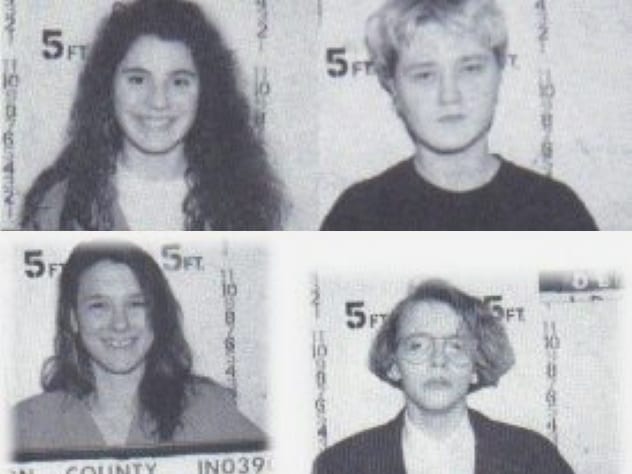
The person most responsible for the torture murder of 12-year-old Shanda Sharer was Melinda Loveless (upper left above), a vindictive teenager originally from New Albany, Indiana. Like her friends, Laurie Tackett (upper right above), Hope Rippey (lower left above), and Toni Lawrence (lower right above), Loveless came from a home that was beyond broken.
Loveless’s father was a Vietnam veteran with several sexual fetishes. Larry Loveless liked to watch other men have sex with his wife, and he was known to sleep while wearing his wife’s and daughter’s clothing. Larry, a former probation officer and mailman, finally pushed his wife and daughter to the limit when he forced Marjorie Loveless, Melinda’s mother, to participate in an orgy. After a suicide attempt, Marjorie nearly stabbed her husband to death in 1990, after she caught him spying on their daughter.
The head of the Tackett household was a fervent Pentecostal Christian and spendthrift who may have also molested his young daughter. Hope Rippey accused her parents of sexually molesting her as well, while Toni Lawrence, who engaged in cutting herself after she, too, was molested and even raped, lived in a household that believed in demons and the power of Ouija boards.
All of these damaged young girls knew each other and hung out together. Unbeknownst to all but Loveless, they would soon be involved in one of the worst murders in Indiana’s history. It all apparently began when Loveless saw Sharer and Amanda Heavrin hanging out together at a school function in October 1991. Loveless and Heavrin had recently been in a romantic relationship, and the jealous and enraged Loveless could not stand the idea of Heavrin starting a new relationship with Sharer.
On the night of January 10, 1992, 16-year-old Loveless, 17-year-old Tackett, 15-year-old Lawrence, and 15-year-old Rippey drove to the Sharer family house in Jeffersonville, Indiana. During the drive, Loveless flashed a large knife and said that she intended to use it in order to “scare” Sharer.
At around 12:30 AM, Rippey and Tackett talked Sharer into riding with them to the Witch’s Castle, a supposedly haunted spot popular with local teenagers. Once in the car, the girls began talking to Sharer about her relationship with Heavrin. Loveless, who had been hiding underneath a blanket, jumped up and held the knife to Sharer’s throat. This was the beginning of Sharer’s long and awful ordeal.
From them until the time of her death, Sharer was tortured relentlessly by Loveless, Tackett, and Rippey. (Lawrence stayed on the periphery and did not fully participate in the torture.) The teens stripped Sharer nude and kept her hidden in the trunk while they drove around aimlessly for hours. At Tackett’s home in Madison, Indiana, they pulled over and beat Sharer to a pulp. The original goal was to slit Sharer’s throat, but the knife proved too dull. Incensed, the girls stabbed their victim again and again. When they thought that Sharer was dead, they threw her into the car’s trunk and washed the blood off in Tackett’s home. Somehow, although barely alive, Sharer began calling out for help. Tackett silenced the 12-year-old girl by stabbing her several more times with a paring knife. Even this did not kill Sharer. It took a tire iron and a fire to kill Shanda Sharer. After it was all said and done, the girls drove to a McDonald’s and got some breakfast. They compared their sausage sandwiches to Sharer’s burned corpse.[11]
Loveless and Tackett ultimately got 60 years in prison. Rippey was slapped with a reduced sentence of 35 years and was released from prison on April 28, 2006. Toni Lawrence served nine years in prison before earning parole in December 2000.
Read about more brutal, cold-blooded murders on 10 Horrific College Dorm Murders and 10 Awful Rampage Killings That Happened Outside The US.








